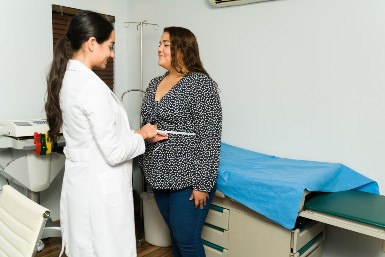
Draft guidance issued today (Thursday 28 September 2023) states the evidence shows endoscopic sleeve gastroplasty (ESG) is safe in the short and long term when combined with lifestyle changes and could help with weight loss in people with a BMI over 30, who have not lost weight with lifestyle modification alone, and who are not suitable or do not wish to undergo bariatric surgery.
NICE’s interventional procedures advisory committee has reviewed the evidence behind ESG which is minimally invasive, takes up to 90 minutes to complete, and patients can usually go home on the same day. The stomach is not cut or removed, and the procedure may be reversible. It could offer people an alternative to bariatric surgery.
Carried out under general anaesthetic, a surgeon will guide a flexible tube containing a camera and medical instruments through the mouth and into the stomach. Sections of the stomach wall are folded and stitched together to reduce its size to create a tube-like sleeve.
The aim is to reduce the volume of the stomach and therefore limit the amount of food which can be eaten at one time and make one feel fuller soon. Published clinical trial research found 59 (77%) of 77 participants lost 25% or more of their original weight a year after having the procedure.
NICE’s committee has recommended the procedure is only carried out in specialist centres by a clinician with specific training and experience in the procedure and on patients selected by a multidisciplinary team experienced in managing obesity.
Details about everyone having ESG should be submitted into the National Bariatric Surgery Registry.
Professor Jonathan Benger, chief medical officer at NICE, said: “We know people who live with obesity or who are overweight are more likely to be at risk of other conditions such as type 2 diabetes, hypertension or cardiovascular disease. A procedure which helps to reduce a person’s weight is one way to lower the risk of developing these conditions, and to improve overall health and wellbeing.
“Our committee has found endoscopic sleeve gastroplasty for people living with obesity to be a safe and effective procedure which can reduce the size of the stomach and therefore make them feel fuller on a smaller amount of food.
“One of the benefits is that this procedure can be carried out as a day case, and not involve an overnight stay, reducing the time people spend in hospital compared with other surgical options. Recovery is also quicker.
“Surgical treatment options are in high demand and not everyone wants, or is fit enough, to undergo an operation like bariatric surgery. A non-invasive procedure like endoscopic sleeve gastroplasty could be a welcomed new option for some people.”
The Health Survey for England 2021 estimates that 25.9% of adults in England are obese and a further 37.9% are overweight. Obesity costs the NHS around £6.5 billion a year and is the second biggest preventable cause of cancer.
The NICE guideline on obesity includes recommendations involving dietary advice, exercise, lifestyle changes and medication.
Bariatric surgery is recommended as a treatment option in some people who have a BMI of 40 or more. It can be offered to those who have a BMI between 35 and 39.9 who have other significant diseases such as type 2 diabetes and have attempted to lose weight using other methods but these have failed. It is also considered at a lower BMI than in other populations for people of Asian family background who have recent-onset type 2 diabetes.
A consultation on the draft recommendations has begun at nice.org.uk until Thursday 26 October 2023.